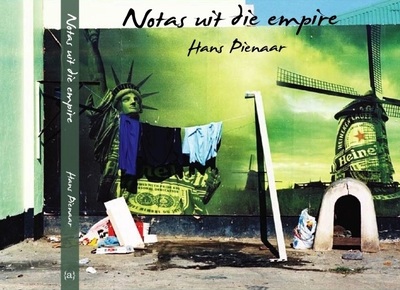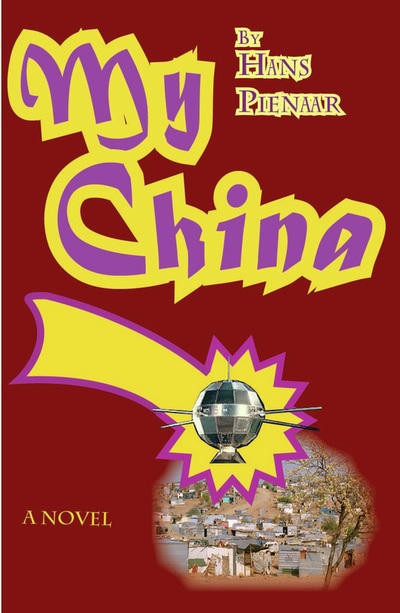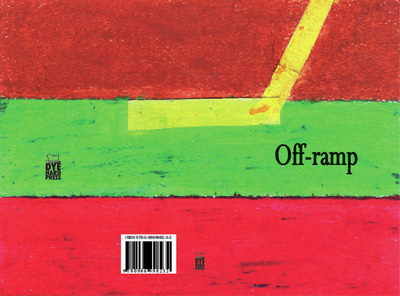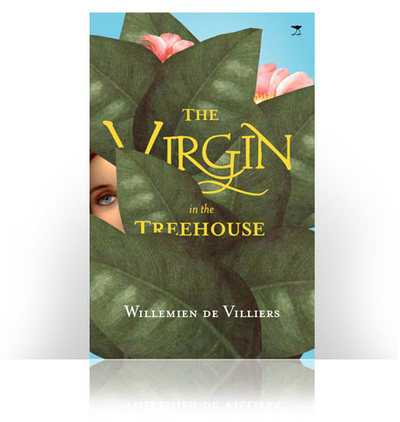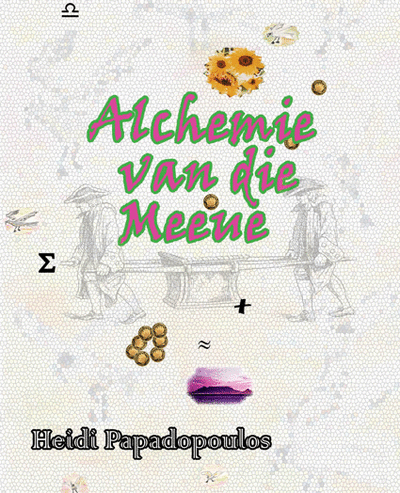Altoviolet is 'n alternatiewe uitgewery wat spesialiseer
in hulp met niche publikasies / Altoviolet is an alternative publisher specialising in assistance with niche publications
Hans Pienaar Neels Blom Corne Coetzee
Heidi Papadopoulos Gary Cummiskey Karoly Pinter
Willemien de Villiers Gerard Rudolf Ron Smerczak
Kommentaar: Te Veel Sorge
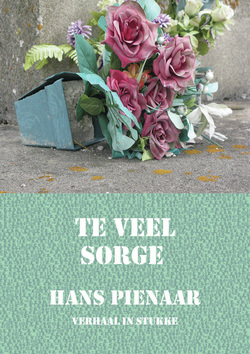
Johann Rossouw, Vrystaatse filosoof: Hans Pienaar se bundel – of sal ’n mens dit ’n fragmente-roman noem – bevat ’n aantal skitterende uitbeeldings van veral Afrikaanse mans se stryd om ’n greep op Afrika te kry. Pienaar het ’n unieke en plesierige humor, maar die ernstige sketse slaan jou hard, en soms herinner die gedrae gevoel ’n mens aan Chris Barnard se Kirst of Elsa Joubert se Ons wag op die kaptein. Dis ’n belangrike boek hierdie in dieselfde klas as Kleinboer en Dana Snyman se werk.
Anel Heydenrych, skrywer van die blitsverkoper, Malhuis: Pienaar is ’n meester. Sy kortkuns is spanningsdrama op sy beste.
Gerda Taljaard, romanskrywer en mede-samesteller van Skrik op die lyf: Verhale in ’n lekker vertelstyl wat die liminale angs van die huidige Zeitgeist weerspieël.
Stellenbosse kritikus Louise Viljoen op Litnet: Ten slotte bied hierdie bundel of roman-in-stukke veel vir die leser wat bereid is om aandagtig te lees, te soek na die samehange en gevoelig is vir die kompleksiteite onderliggend aan bekende temas soos die middeljarige wit man se aanpassing by nuwe omstandighede, skuldgevoelens, boetedoening, vergifnis, swendelary, liefdeservarings en seksuele obsessies ... ’n gedetailleerde en verwikkelde beeld van die onsekere oorgangsfase wat gevolg het op Suid-Afrika se eerste demokratiese verkiesing. Te veel sorge bied boeiende raakpunte met Harry Kalmer se ’n Duisend stories oor Johannesburg.
Riette Rust in Rapport: Hoewel ons wat as deel van die verdrukker gesien is, nooit werklik die diepte van die seer en vernedering van soveel van ons landgenote sal kan begryp nie, worstel baie nou, nes die hoofl<arakter in Te veel sorge, met skuldgevoelens en 'n behoefte aan boetedoening. Met hierdie “verhaal in stukke” kry “die Afrikaner” nou ook 'n spreekbeurt. Dis 'n stryd om sin te maak van die politieke verlede en die uitdagíngs wat die nuwe bestel bied, lees jy. Die gebrek aan sin en hoop is vandag wel vir baie Suid-Afrikaners 'n reële kwessie, daarom is die optekening en beligting van .hierdie deel van ons geskiedenis belangrik.
Riaan Grobler in Die Taalgenoot: Elke verhaal het iets oor die kompleksiteit van Afrika te sê en veral die plek van ’n wit, middeljarige man op ’n postkoloniale kontinent ná apartheid; sy/hul soeke na identiteit en plek; en sy/hul worsteling met die verlede, waaraan hulle deur assosiasie aandadig is. Dit is dié sorge wat die skrywer subtiel en genuanseerd verwoord in ’n knap bundel “stukke”, wat so gefragmenteerd is soos sy tema.
Anel Heydenrych, skrywer van die blitsverkoper, Malhuis: Pienaar is ’n meester. Sy kortkuns is spanningsdrama op sy beste.
Gerda Taljaard, romanskrywer en mede-samesteller van Skrik op die lyf: Verhale in ’n lekker vertelstyl wat die liminale angs van die huidige Zeitgeist weerspieël.
Stellenbosse kritikus Louise Viljoen op Litnet: Ten slotte bied hierdie bundel of roman-in-stukke veel vir die leser wat bereid is om aandagtig te lees, te soek na die samehange en gevoelig is vir die kompleksiteite onderliggend aan bekende temas soos die middeljarige wit man se aanpassing by nuwe omstandighede, skuldgevoelens, boetedoening, vergifnis, swendelary, liefdeservarings en seksuele obsessies ... ’n gedetailleerde en verwikkelde beeld van die onsekere oorgangsfase wat gevolg het op Suid-Afrika se eerste demokratiese verkiesing. Te veel sorge bied boeiende raakpunte met Harry Kalmer se ’n Duisend stories oor Johannesburg.
Riette Rust in Rapport: Hoewel ons wat as deel van die verdrukker gesien is, nooit werklik die diepte van die seer en vernedering van soveel van ons landgenote sal kan begryp nie, worstel baie nou, nes die hoofl<arakter in Te veel sorge, met skuldgevoelens en 'n behoefte aan boetedoening. Met hierdie “verhaal in stukke” kry “die Afrikaner” nou ook 'n spreekbeurt. Dis 'n stryd om sin te maak van die politieke verlede en die uitdagíngs wat die nuwe bestel bied, lees jy. Die gebrek aan sin en hoop is vandag wel vir baie Suid-Afrikaners 'n reële kwessie, daarom is die optekening en beligting van .hierdie deel van ons geskiedenis belangrik.
Riaan Grobler in Die Taalgenoot: Elke verhaal het iets oor die kompleksiteit van Afrika te sê en veral die plek van ’n wit, middeljarige man op ’n postkoloniale kontinent ná apartheid; sy/hul soeke na identiteit en plek; en sy/hul worsteling met die verlede, waaraan hulle deur assosiasie aandadig is. Dit is dié sorge wat die skrywer subtiel en genuanseerd verwoord in ’n knap bundel “stukke”, wat so gefragmenteerd is soos sy tema.
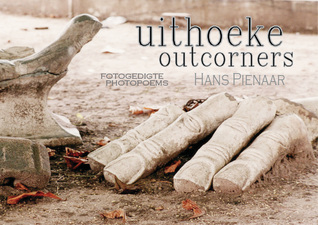
Uithoeke/Outcorners
Hans Pienaar se unieke fotogedigte, uitgestal op verskeie uitstallings, is nou saamgevat in 'n bundel wat beloof om 'n versamelaarsitem te word.
Marius Crous skryf op Versindaba: “Hans Pienaar se fotogedigte maak beslis van die ontmoeting tussen gefotografeerde subjek en geskrewe teks ‘n uitsonderlike ervaring. (Hans Pienaar’s photopoems certainly turns the meeting between photographed subject and written text into an exceptional experience.)”
Rudolf Stehle skryf vir Netwerk24: “Dié versameling is ’n welkome toevoeging tot die poësieskat in sowel Afrikaans as Engels. Uithoeke/Outcorners is ’n pragpublikasie, luuks uitgegee met glanspapier en volkleurfoto’s waarvan die drukgehalte van die boonste rak is. (This collection is a welcome supplement to the poetry treasure in both Afrikaans and English. Uithoeke/Outcorners is a beautiful publication, luxuriously issued in glossy paper and full-colour photographs of which the production quality is from the top shelf.)”
Stehle adds: “The English translations are consistently skillful.”
Charl-Pierre Naudé: “Hans Pienaar’s intra-collaboration – between two parts of his creative soul – is by far one of the most interesting manifestations of this kind. It changes the way photography would normally act as well as the way poetry acts. Under pressure of one another, the two modes change the nature of their “will”, so to speak. This is a bold experiment. But what it contains above all is a soothing beauty. As well as perpendicular exhiliration.”
Francis Galloway: “ ’n Fantastiese projek.”
Met fotogedigte gaan ’n mens verder as net die gebruik van foto’s as illustrasies by gedigte, of andersom. Hulle kan nie afsonderlik van mekaar gelees word nie en die digelemente van die fotogedigte is nie bedoel om selfstandig te bestaan nie – afsonderlik gelees sal hulle nie altyd sin maak nie.
Maar die sleutel tot die bundel is in die eerste plek: plesier. Van lees, van ’n misterieuse foto, die kleure daarvan, die onverwagse komposisie, die skielike insigte. Die plesier van woorde, gedagtes en beelde in ’n nouer verband as net dié van kommunikasie.
Op die ou end, die plesier van grense oortree, en nuwe maniere van dink en doen beproef. Die
fotogedigte in hierdie bundel volg nie die huidige reëls van die digkuns nie. Die taboe teen rym is nie toegepas nie, maar soms is hulle ook te prosaïes vir sommige smake.
The key to this collection – first conceived in Afrikaans and then translated into English – is simple: pleasure. The pleasure of reading, of words and images, of the mysteries of a certain kind of photograh, its colours, its uncanny composition, the sudden insights. The pleasure of thoughts, images and phrases in a tighter relation than during daily communication.
With photopoems the idea is to go further than the mere attachment of photos to poems as illustrations, or vice versa. The poetic and photographic elements are not read in isolation from each other and the poetical elements are not meant to exist as independent poems.
Hans Pienaar se unieke fotogedigte, uitgestal op verskeie uitstallings, is nou saamgevat in 'n bundel wat beloof om 'n versamelaarsitem te word.
Marius Crous skryf op Versindaba: “Hans Pienaar se fotogedigte maak beslis van die ontmoeting tussen gefotografeerde subjek en geskrewe teks ‘n uitsonderlike ervaring. (Hans Pienaar’s photopoems certainly turns the meeting between photographed subject and written text into an exceptional experience.)”
Rudolf Stehle skryf vir Netwerk24: “Dié versameling is ’n welkome toevoeging tot die poësieskat in sowel Afrikaans as Engels. Uithoeke/Outcorners is ’n pragpublikasie, luuks uitgegee met glanspapier en volkleurfoto’s waarvan die drukgehalte van die boonste rak is. (This collection is a welcome supplement to the poetry treasure in both Afrikaans and English. Uithoeke/Outcorners is a beautiful publication, luxuriously issued in glossy paper and full-colour photographs of which the production quality is from the top shelf.)”
Stehle adds: “The English translations are consistently skillful.”
Charl-Pierre Naudé: “Hans Pienaar’s intra-collaboration – between two parts of his creative soul – is by far one of the most interesting manifestations of this kind. It changes the way photography would normally act as well as the way poetry acts. Under pressure of one another, the two modes change the nature of their “will”, so to speak. This is a bold experiment. But what it contains above all is a soothing beauty. As well as perpendicular exhiliration.”
Francis Galloway: “ ’n Fantastiese projek.”
Met fotogedigte gaan ’n mens verder as net die gebruik van foto’s as illustrasies by gedigte, of andersom. Hulle kan nie afsonderlik van mekaar gelees word nie en die digelemente van die fotogedigte is nie bedoel om selfstandig te bestaan nie – afsonderlik gelees sal hulle nie altyd sin maak nie.
Maar die sleutel tot die bundel is in die eerste plek: plesier. Van lees, van ’n misterieuse foto, die kleure daarvan, die onverwagse komposisie, die skielike insigte. Die plesier van woorde, gedagtes en beelde in ’n nouer verband as net dié van kommunikasie.
Op die ou end, die plesier van grense oortree, en nuwe maniere van dink en doen beproef. Die
fotogedigte in hierdie bundel volg nie die huidige reëls van die digkuns nie. Die taboe teen rym is nie toegepas nie, maar soms is hulle ook te prosaïes vir sommige smake.
The key to this collection – first conceived in Afrikaans and then translated into English – is simple: pleasure. The pleasure of reading, of words and images, of the mysteries of a certain kind of photograh, its colours, its uncanny composition, the sudden insights. The pleasure of thoughts, images and phrases in a tighter relation than during daily communication.
With photopoems the idea is to go further than the mere attachment of photos to poems as illustrations, or vice versa. The poetic and photographic elements are not read in isolation from each other and the poetical elements are not meant to exist as independent poems.
My China
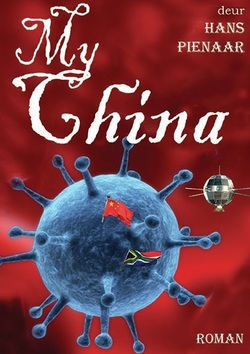
Iggy Jansen sukkel. Sy brein vat nie meer so lekker nie, en hy kan goed nie onthou nie. Daar is al die verwysings na Chinese dinge in sy lewe, soos die satelliet wat op die aarde wil val. Te midde hiervan duur die nuwe Koue Oorlog van die mikrobe teen die mensdom voort.
Maar daar is 'n Derde Mag wat sy tekortkominge sien as talente. Wanneer hy uiteindelik uit hul kloue ontsnap, kom hy voor ’n sonderlinge uitdaging te staan: Hy moet aan die hof bewys dat hy skuldig is aan moord. Terwyl die staat probeer bewys hy is onskuldig.
Intussen het die nuwe regering probleme van sy eie. Wat doen jy met al die vernuf vergader in dekades van opleiding in die weermag? Privatisering is een antwoord – baie mense daarbuite stel belang om ’n SpesOps brigade aan te koop, veral een wat nie bestaan nie.
Deon Maas noem My China 'n "belangrike boek". Hy skryf in Beeld: "Vir mense van my ouderdom is dit 'n goeie nostalgiese meesleurdery (wie't nou ooit kon dink dat ons nostalgies oor PW Botha sou raak). Die storie is sterk, jy moet 'n spoegbakkie tussen jou voete hou ... en die karakters herinner jou aan niemand wat jy nog ooit ontmoet het nie (of hoop om ooit te ontmoet nie). Wat aangryp van Pienaar is dat hy skrokkeloos skep sonder om noodwendig 'n mark daarvoor te probeer kry.
My China is die soort boek wat 'n groot treffer sou gewees het in die 1980s se ondergrond, saam met films soos Darryl Roodt se The Stick en musiek van die Naaimasjiene."
Graeme Feltham skryf vir Business Day: "This very South African book is permeated with shades of incredulity about our collective and private pasts. Did it really happen? And if it did, did it happen as I recall it? As we recall it? The difference?
Iggy Jansen and his sieve-like memory as a metaphor for our collective past so too are our commissions in search of the truth thrown into question. Pienaar has you looking at your past anew, succeeding in getting the reader to reflect on that dichotomous trap of goodies and baddies that even those among us with the most finely tuned analytical apparati at times succumb to.
Structures of feeling belonging to being in this country in the 80s and on into the new millenium inform this work and are channelled to the reader in an intelligently visceral fashion.
The reader will inevitably root for Iggy while his moments of lucidity (and concord) morph into the downright ludicrous (ag, no man) and back again. Pienaar wields this literary device masterfully."
Maar daar is 'n Derde Mag wat sy tekortkominge sien as talente. Wanneer hy uiteindelik uit hul kloue ontsnap, kom hy voor ’n sonderlinge uitdaging te staan: Hy moet aan die hof bewys dat hy skuldig is aan moord. Terwyl die staat probeer bewys hy is onskuldig.
Intussen het die nuwe regering probleme van sy eie. Wat doen jy met al die vernuf vergader in dekades van opleiding in die weermag? Privatisering is een antwoord – baie mense daarbuite stel belang om ’n SpesOps brigade aan te koop, veral een wat nie bestaan nie.
Deon Maas noem My China 'n "belangrike boek". Hy skryf in Beeld: "Vir mense van my ouderdom is dit 'n goeie nostalgiese meesleurdery (wie't nou ooit kon dink dat ons nostalgies oor PW Botha sou raak). Die storie is sterk, jy moet 'n spoegbakkie tussen jou voete hou ... en die karakters herinner jou aan niemand wat jy nog ooit ontmoet het nie (of hoop om ooit te ontmoet nie). Wat aangryp van Pienaar is dat hy skrokkeloos skep sonder om noodwendig 'n mark daarvoor te probeer kry.
My China is die soort boek wat 'n groot treffer sou gewees het in die 1980s se ondergrond, saam met films soos Darryl Roodt se The Stick en musiek van die Naaimasjiene."
Graeme Feltham skryf vir Business Day: "This very South African book is permeated with shades of incredulity about our collective and private pasts. Did it really happen? And if it did, did it happen as I recall it? As we recall it? The difference?
Iggy Jansen and his sieve-like memory as a metaphor for our collective past so too are our commissions in search of the truth thrown into question. Pienaar has you looking at your past anew, succeeding in getting the reader to reflect on that dichotomous trap of goodies and baddies that even those among us with the most finely tuned analytical apparati at times succumb to.
Structures of feeling belonging to being in this country in the 80s and on into the new millenium inform this work and are channelled to the reader in an intelligently visceral fashion.
The reader will inevitably root for Iggy while his moments of lucidity (and concord) morph into the downright ludicrous (ag, no man) and back again. Pienaar wields this literary device masterfully."
My China
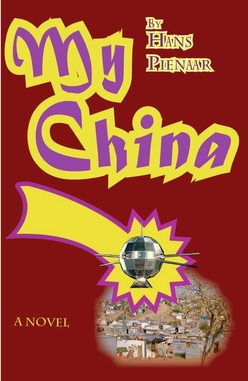
Iggy Jansen struggles with life. He can’t remember things properly. Then there are the microbes and all the things
Chinese in his life.
Bu there is a Third Force which sees his deficiencies as skills, to be developed with other new technologies in the forces. When at last he finds a way to escape from their clutches, he is faced with an impossible task: he has to prove in court that he is guilty of murder. While the state must show he is not guilty.
And the questions nag: What does Tiananmen Square have to do with Nelson Mandela? And has a Chinese satellite fallen on South Africa?
Meanwhile the new govenment has problems of its own. What does one do with all the skills and techniques developed over decades in the defence force? Privatisation is one answer. There are many people out there interested in buying a SpesOps brigade, especially one that doesn’t exist.
Graeme Feltham writes for Business Day: "This very South African book is permeated with shades of incredulity about our collective and private pasts. Did it really happen? And if it did, did it happen as I recall it? As we recall it? The difference?
Iggy Jansen and his sieve-like memory as a metaphor for our collective past so too are our commissions in search of the truth thrown into question. Pienaar has you looking at your past anew, succeeding in getting the reader to reflect on that dichotomous trap of goodies and baddies that even those among us with the most finely tuned analytical apparati at times succumb to.
Structures of feeling belonging to being in this country in the 80s and on into the new millenium inform this work and are channelled to the reader in an intelligently visceral fashion.
The reader will inevitably root for Iggy while his moments of lucidity (and concord) morph into the downright ludicrous (ag, no man) and back again. Pienaar wields this literary device masterfully.
Giblets of horror (remnants of Iggy's and our collective pasts) catch you unawares and smack you in the face as you in turn delight and recoil at the other characters and Iggy's “revelations” as his circumstances and sincere efforts unpeal him to himself and others as he struggles to find out who the hell he is. Pienaar has imbued his flawed antihero with a searing honesty."
Chinese in his life.
Bu there is a Third Force which sees his deficiencies as skills, to be developed with other new technologies in the forces. When at last he finds a way to escape from their clutches, he is faced with an impossible task: he has to prove in court that he is guilty of murder. While the state must show he is not guilty.
And the questions nag: What does Tiananmen Square have to do with Nelson Mandela? And has a Chinese satellite fallen on South Africa?
Meanwhile the new govenment has problems of its own. What does one do with all the skills and techniques developed over decades in the defence force? Privatisation is one answer. There are many people out there interested in buying a SpesOps brigade, especially one that doesn’t exist.
Graeme Feltham writes for Business Day: "This very South African book is permeated with shades of incredulity about our collective and private pasts. Did it really happen? And if it did, did it happen as I recall it? As we recall it? The difference?
Iggy Jansen and his sieve-like memory as a metaphor for our collective past so too are our commissions in search of the truth thrown into question. Pienaar has you looking at your past anew, succeeding in getting the reader to reflect on that dichotomous trap of goodies and baddies that even those among us with the most finely tuned analytical apparati at times succumb to.
Structures of feeling belonging to being in this country in the 80s and on into the new millenium inform this work and are channelled to the reader in an intelligently visceral fashion.
The reader will inevitably root for Iggy while his moments of lucidity (and concord) morph into the downright ludicrous (ag, no man) and back again. Pienaar wields this literary device masterfully.
Giblets of horror (remnants of Iggy's and our collective pasts) catch you unawares and smack you in the face as you in turn delight and recoil at the other characters and Iggy's “revelations” as his circumstances and sincere efforts unpeal him to himself and others as he struggles to find out who the hell he is. Pienaar has imbued his flawed antihero with a searing honesty."
